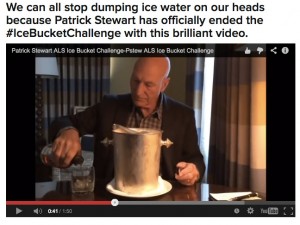News outlets often struggle with how to write about Internet memes, but BuzzFeed seems to have viral news coverage down to a science.
Its reporters follow an unofficial formula that mirrors the rise and fall of a typical Internet meme and tracks people’s response to it, with coverage ramping up fast and then trailing off as people get sick of reading about it, according to Ryan Broderick, the BuzzFeed staffer who covered the recent ALS Ice Bucket Challenge.
“People really love this stuff,” Broderick said. “And then they want to see really cool ones, and then they want it to go away. That’s kind of how we went about [covering] it.”
First comes the explainer, Broderick said, followed by reaction and commentary pieces, before BuzzFeed focuses its coverage on the unusual approaches to the meme.
When confronting any new meme, a reporter’s initial job is to explain what’s happening, as Broderick did when the ice bucket challenge doused the Internet this past summer in hashtags and humble-bragging about the latest philanthropic trend.
“With most of those kind of memes like the Harlem Shake…we typically do a piece in the beginning explaining it,” Broderick said, “because a lot of times when they surface, people aren’t really sure why other people are doing them.”
That’s exactly what Broderick did when someone nominated him to dump ice on his head to help raise money for ALS, or Lou Gehrig’s disease — a challenge he accepted and quickly turned into a post describing it on Aug. 7 titled, “Here’s Why All Your Facebook Friends Are Taking The #IceBucketChallenge.”
Broderick ended his post with a Vine of himself getting dunked upside-down in a bucket of freezing water, with a text overlay challenging “the rest of the Internet to take it up.”
The ice bucket meme started in July and continued all summer, bringing in more than $100 million for ALS research from more than 3 million donors, according to a Time article published on Aug. 29.
By the time people started to tire of reading about it, BuzzFeed was already dialing back and only covering highlights, such as when a celebrity did something fun.
“The trick is to really cherry-pick ones that make you surprised or they’re fascinating,” Broderick said.
It can be tricky, though, knowing exactly when to curtail coverage.
“It’s, I think, part of the way the media is learning to deal with Internet memes—we have a tendency to burn them out really hard, which is almost part of it,” said Broderick.
Putting the ME in meme
By actively participating in some memes, BuzzFeed eschews the traditional media’s more detached approach to coverage.
While BuzzFeed and Broderick had no qualms about joining in, some media observers question whether active participation in Internet memes impairs the fairness and impartiality of a news outlet’s coverage.
“Ethically, if you are going to do [the challenge] for one organization, why aren’t you doing it for another organization?” said Ronald Yaros, an associate professor at the Philip Merrill College of Journalism at the University of Maryland. “And what happens when the next organization knocks on your door—are you going to continue devoting your time and resources to participating in the event? And if not, what reason will you give that next organization for not directly participating?”
Broderick disagreed. He called the ice bucket challenge “harmless” and said he appreciates BuzzFeed’s flexibility when it comes to interacting with Internet culture. “It’s definitely a fair debate to have,” he said. “The idea of meme coverage as a journalistic genre is relatively new. And every time a meme like this pops up, the rules are always different.”
The debate over meme participation also played out among college journalists.
The Daily Iowan, the University of Iowa’s independent daily newspaper, accepted the ice bucket challenge from its rivals at The Iowa State Daily at Iowa State University. The newsroom made a YouTube video of the challenge and extended an invitation to the students at The Daily Collegian at Penn State University.
The Daily Collegian newsroom, however, declined, citing ethical grounds, saying it “calls into question our integrity as an impartial reporter of the news.”
Jordyn Reiland, the editor-in-chief of The Daily Iowan, defended her paper’s decision, explaining the aim was not to become a part of the story.
“It wasn’t our intention to say, ‘Look what the University of Iowa is doing,” she said. “It was more so, ‘Look what this particular cause and awareness campaign is doing for other people.’”
The ALS Ice Bucket Challenge, of course, isn’t the first and won’t be the last viral Internet phenomenon. And according to Broderick, there is pressure to make each new meme story better than the last. He said a feeling of “one-upmanship” raises the threshold for entertaining the audience and puts pressure on each news outlet to produce more popular content.
“If you saw one last week on the site, you’re going to see one now that’s even better than what you saw,” Broderick said.






Leave a Comment